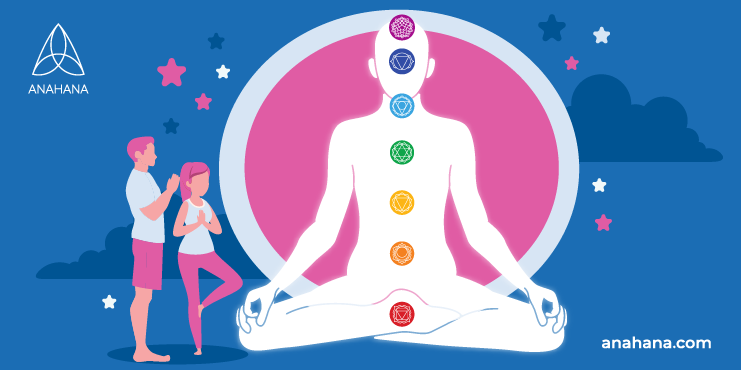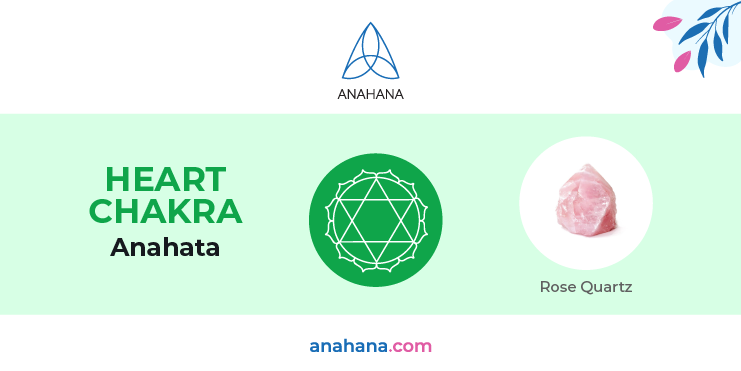
Table of Contents
Discover the key to emotional balance and compassion by exploring the nuances of the heart chakra. Unlock practical techniques to open and align this energy center, fostering love and connection. Elevate your physical well-being with insights on nurturing the Heart Chakra for a more fulfilling life
Heart Chakra Explained
The Heart Chakra or Anahata chakra is the fourth energy center of the seven main chakra, located in the center of the breastbone.
As the spiritual heart center, it governs people's love for themselves and those around them, supporting empathy, compassion, and forgiveness.
Outline of the Heart Chakra
-
Location: Heart, Chest, Upper Back, Shoulders
-
Heart Chakra Symbol: Twelve-petaled lotus.
-
Element: Air
-
Associated Color: Green Chakra
-
Bija Mantra(seed syllable): HAM
-
Affirmations: Heart Chakra Affirmations
-
Sanskrit Name: Anahata (meaning: unstruck, unhurt, or unbeaten)
-
Nerve Plexus: Cardiac Plexus
-
Endocrine Gland: Thymus
-
Main Issues: Love, relationships, purpose, belonging to humanity
-
Goals: Balance, compassion, self-acceptance, good relationships
-
Excessive: Codependency, poor boundaries, possessive, jealous, narcissistic
-
Deficient: Shy, lonely, isolated, lack of empathy, bitter, critical
-
Resolution: Compassion, empathy, forgiveness
-
Associated crystals: Heart Chakra crystals such as Jade, Amazonite, Malachite
Origins of the Heart Chakra

The Chakra system originated in India between 1500 and 500 BCE. It was first mentioned in the ancient text called the Vedas, which introduces the seven primary chakras.
In Sanskrit, the Heart Chakra is called the Anahata chakra, which translates as unstruck, unhurt, or unbeaten. The Heart Chakra comes after the Root Chakra, Sacral Chakra, and Solar Plexus Chakra, with the Throat Chakra, Third Eye Chakra, and Crown Chakra following. Altogether, this creates the body's chakra energy system.
Concepts of the seven chakras came to the Western world in the 1880s from tantric yoga traditions and are increasingly studied and practiced due to their extensive benefits.
Functions of the Heart Chakra
As the fourth chakra, the Heart chakra, or Anahata, is at the center of the seven chakras.
It plays an essential role in the chakra system by bridging the lower and upper chakras. With this vital role, a balanced Heart Chakra can support harmony and ease through divine experiences.
It is within our hearts that we can accept our whole selves. Life-force energy lies dormant at the base of the spine until it is awakened through practices such as chakra meditation, asanas, Pranayama, and mantra.
When heart energy flows through the fourth chakra, individuals often experience heightened joy, self-esteem, and self-love. This helps you to feel motivated and have a deeper understanding of your purpose in life.
Heart Chakra blockage can negatively impact the physical body and mental health. Some of the symptoms may include:
Physical Symptoms
-
Heart palpitations
-
Low or high blood pressure
Mental Symptoms
-
Co-dependency
-
Fear
A blocked Heart Chakra makes it difficult for people to connect and be aware of their emotions, making it difficult to feel self-compassion, empathy, or forgiveness.
This makes it challenging for people to have unconditional love for those in their lives, making it hard to have a loving relationship with others.
Those experiencing these symptoms may benefit from practicing some of our recommended chakra healing exercises so life-force energy can flow freely through the human body.
How to Balance the Heart Chakra

Several practices support the opening and balancing of the Heart chakra. Here are some exercises that bring imbalanced heart chakra back into alignment:
Crystals
Chakra stones and crystals can support loving energy to run free through the chakra system. They can be used by placing the crystal over the chakra during meditation, distributing them around the home, wearing them as jewelry, such as a chakra bracelet, or carrying them around.
In addition to most pink crystals, some crystals that may be beneficial for the Heart Chakra include:
-
Jade: Balance
-
Rhodochrosite: Trauma and fear
-
Rose Quartz: Self-love and peace
-
Malachite: Protection and love
-
Amazonite: Harmony
Repeating Affirmations
Repeating loving affirmations aloud, mentally, or in writing can cleanse negative energy and support positive thought patterns. Some examples of positive affirmations that support the health of one’s heart Chakra include:
-
“I give and receive love freely”
-
"It is easy to feel compassion for others and myself”
-
"I completely love and accept myself"
-
"Unconditional Love is all around me"
-
“I am lovable, I am loving, I am love”
Yoga Asanas
Certain yoga poses help open the Anahata chakra. Here are three great Heart Chakra yoga poses that will assist in healthy alignment through the fourth chakra:
-
Camel Pose (Ustrasana): Begin kneeling with your knees hip-width apart and the tops of your feet flat on the mat. Put your hands on your lower back. Shift your eye line up and slowly lean back, reaching for your heels. Take several breaths before exiting the pose.
-
Sphinx Pose (Salamba Bhujangasana): Lye on your stomach and place your elbows underneath your shoulders. Push your shoulder blades down and lift your chest, putting weight on your forearms. Take several breaths down into your abdomen before exiting the pose.
-
Bridge Pose (Setu Bandha Sarvangasana): Begin lying on your back with your knees bent and your feet flat on the mat. With your arms by your sides and your hands pressed to the ground, inhale, press into your feet, and lift your hips to the sky. Hold for three to five breaths. Exhale and lower your body.
If none of these methods work for you, other ways to combat blocked energy include writing in a gratitude journal, eating green foods, and practicing self-care.
Frequently Asked Questions
What are Heart Chakra essential oils?
Certain essential oils are proven effective for opening the Heart Chakra and for Heart Chakra healing. These can be put in a diffuser, diluted, and put on the skin of the Heart chakra, or used in other creative ways.
Some of the oils proven effective when the Heart Chakra is blocked include:
-
Rose oil: for love, compassion, and enlightenment
-
Pine oil: for healing trauma and softening the heart
What happens when you open the Heart chakra?
The Heart Chakra is the gatekeeper for emotions, and life trauma often leads to energetic blocks.
When the Heart Chakra opens, people can release their past grievances and open their souls to kindness, compassion, and forgiveness.
Emotions are often experienced on a deep level after being repressed. This will allow individuals to connect to their higher self and accept what is happening around them without judgment. This allows for a tranquil state of inner peace and relaxation.
Although these are all positive experiences, there may be some discomfort due to the new energy flow, including hot flashes, a heavy chest, and heart palpitations. This is just the body's way of adjusting to the powerful energy in the heart center.
Why is my Heart Chakra burning?
When the Heart Chakra is burning due to chakra healing exercises, the body adjusts to the heart's energy. Heat and hot flashes are often experienced as the Heart Chakra opens and may present in unexpected waves.
References
A Complete Guide to the Chakras and Their Effects on the Mind, Body and Spirit
Chakras: Energy Centers of Transformation
Anahata chakra heart chakra self realization through love
Disclaimer
The contents of this article are provided for informational purposes only and are not intended to substitute for professional medical advice, diagnosis, or treatment. It is always recommended to consult with a qualified healthcare provider before making any health-related changes or if you have any questions or concerns about your health. Anahana is not liable for any errors, omissions, or consequences that may occur from using the information provided.

By: Meriah McCauley
Meriah McCauley is a leading voice in holistic healing, known across North America for her expertise in chakra balancing, spiritual alignment, and energy-based wellness. Her work bridges the art and science of mind-body healing, shaped through years of study, practice, and mentorship. Meriah deepened her understanding of spiritual anatomy and the chakra system under the guidance of her guru, Dr. Don Stapleton, during her immersive training in Costa Rica. She later earned her Master’s degree in Psychology from Columbia University, specializing in Spirituality and the Mind–Body connection, which continues to influence her integrative approach. Today, she supports individuals and practitioners through coaching, yoga teacher trainings, chakra-focused education, and Holotropic Breathwork for personal transformation. Meriah is dedicated to helping others develop emotional clarity, energetic balance, and spiritual resilience—and she remains committed to guiding anyone seeking a deeper, more meaningful connection with themselves.